Letters to the Future
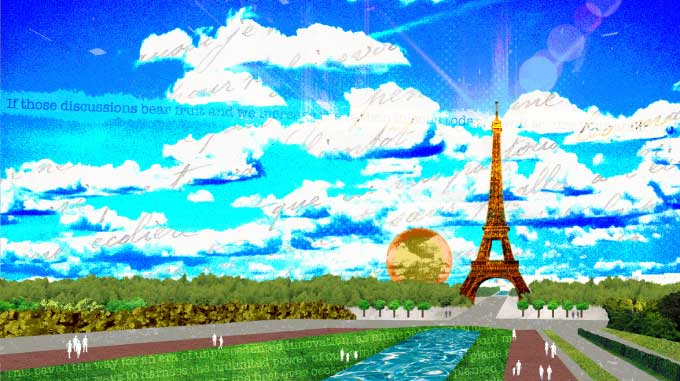
A Collaboration Between the Association of Alternative Newsweeklies and the Media Constorium
World leaders from more than 190 countries will convene in Paris during the first two weeks of December for the long-awaited United Nations Climate Change Conference. Will the governments of the world finally pass a binding global treaty aimed at reducing the most dangerous impacts of global warming ... or will they fail in this task?
Letters to the Future, a national project involving more than 40 alternative weeklies across the United States, set out to find authors, artists, scientists and others willing to get creative and draft letters to future generations of their own families, predicting the success or failure of the Paris talks—and what came after.
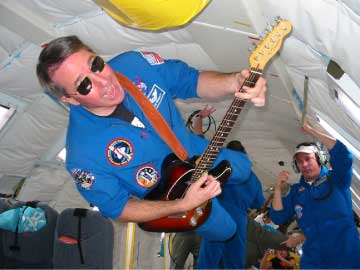
Some participants were optimistic about what is to come—some not so much. We hereby present some of their visions of the future.
Stephen K. Robinson
My Endless Sky
Dear Future Robinsons,
Back around the turn of the century, flying to space was a rare human privilege, a dream come true, the stuff of movies (look it up), and an almost impossible ambition for children the world around.
But I was one of those fortunates. And what I saw from the cold, thick, protective windows of the Space Shuttle is something that, despite my 40 years of dreaming (I was never a young astronaut), I never remotely imagined.
Not that I was new to imagining things. As you may know, I was somehow born with a passion for the sky, for flight, and for the mysteries of the atmosphere. I built and flew death-defying gliders, learned to fly properly, earned university degrees in the science of flight, and then spent the rest of my life exploring Earth’s atmosphere from below it, within it, and above it. My hunger was never satisfied, and my love of flight never waned at all, even though it tried to kill me many times.
As I learned to fly in gliders, then small aircraft, then military jets, I always had the secure feeling that the atmosphere was the infinite “long delirious burning blue” of Magee’s poem, even though of all people, I well knew about space and its nearness. It seemed impossible to believe that with just a little more power and a little more bravery, I couldn’t continue to climb higher and higher on “laughter-silvered wings.” My life was a celebration of the infinite gift of sky, atmosphere, and flight.
But what I saw in the first minutes of entering space, following that violent, life-changing rocket-ride, shocked me.
If you look at Earth’s atmosphere from orbit, you can see it “on edge”—gazing towards the horizon, with the black of space above and the gentle curve of the yes-it’s-round planet below. And what you see is the most exquisite, luminous, delicate glow of a layered azure haze holding the Earth like an ethereal eggshell. “That’s it?!” I thought. The entire sky—MY endless sky—was only a paper-thin, blue wrapping of the planet, and looking as tentative as frost.
And this is the truth. Our Earth’s atmosphere is fragile and shockingly tiny—maybe 4 percent of the planet’s volume. Of all the life we know about, only one species has the responsibility to protect that precious blue planet-wrap. I hope we did, and I hope you do.
Your ancestor,
Stephen K. Robinson
After 36 years as an astronaut—with a tenure that included four shuttle missions and three spacewalks—Robinson retired from NASA in 2012. He is now a professor of mechanical and aerospace engineering at the University of California, Davis.
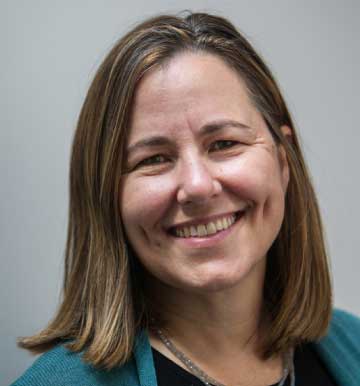
Annie Leonard
Incredible People
It’s hard to imagine writing to the granddaughter of my own daughter, but if you’re anything like her—strong, smart, occasionally a little stubborn—then I have no doubt the world is in good hands.
By now your school should have taught you about climate change, and how humans helped to bring it about with our big cars, big homes, big appetites and an endless desire for more stuff. But what the teachers and textbooks may not have passed on are the stories of incredible people that helped make sure the planet remained beautiful and livable for you.
These are stories of everyday people doing courageous things, because they couldn’t stand by and watch communities poisoned by pollution, the Arctic melt, or California die of fire and drought. They couldn’t bear to think of New Orleans under water again, or New York lost to a superstorm. Right now, as politicians weigh up options and opinion polls, people are organizing and uprising. It’s amazing to see and be a part of.
In the year that led up to the 2015 meeting of global leaders on climate change in Paris, kayakers took to the water to stop oil rigs. Nurses, musicians, grannies, preachers and even beekeepers, took to the streets. The message was loud and clear: “We want clean, safe, renewable energy now!”
Were it not for this glorious rainbow of people power, I don’t know whether President Obama would have stepped up and canceled oil drilling in the Alaskan Arctic or the sale of 10 billion tons of American coal, that were set to tip the planet towards climate chaos. But he did. This paved the way for an era of unprecedented innovation, as entrepreneurs and academics fine-tuned the best ways to harness the unlimited power of our wind, waves and sun, and make it available to everyone. We’ve just seen the first ever oceanic crossing by a solar plane and I can only imagine what incredible inventions have grown in your time from the seeds planted in this energy revolution we’re experiencing right now.
I want to tell you about this because there was a time we didn’t think any of it was possible. And there may be times when you face similar challenges. Generations before you have taken acts of great courage to make sure you too have all the joys and gifts of the natural world—hiking in forests, swimming in clean water, breathing fresh air. If you need to be a little stubborn to make sure things stay that way, so be it.
Onwards!
Annie
Currently the Executive Director of Greenpeace USA, Leonard made the 2007 film, The Story of Stuff, which chronicles the life of material goods and has been viewed more than 40 million times. She also wrote the 2010 New York Times bestseller by the same name.
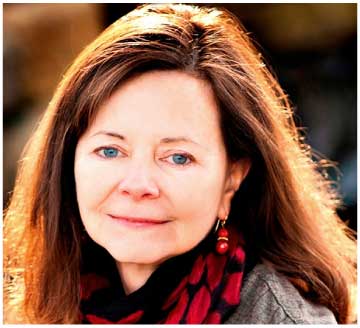
Geraldine Brooks
This Abundant Life
I just flushed my toilet with drinking water. I know: you don’t believe me: “Nobody could ever have been that stupid, that wasteful.” But we are. We use air conditioners all the time, even in mild climates where they aren’t a bit necessary. We cool our homes so we need to wear sweaters indoors in summer, and heat them so we have to wear T-shirts in mid-winter. We let one person drive around all alone in a huge thing called an SUV. We make perfectly good things—plates, cups, knives—then we use them just once, and throw them away. They’re still there, in your time. Dig them up. They’ll still be useable.
Maybe you have dug them up. Maybe you’re making use of them now. Maybe you’re frugal and ingenious in ways we in the wealthy world have not yet chosen to be. There’s an old teaching from a rabbi called Nachman who lived in a town called Bratslav centuries ago: “If you believe it is possible to destroy, believe it is possible to repair.” Some of us believe that. We’re trying to spread the message.
Friends are working on genetic editing that will bring back the heath hen, a bird that went extinct almost 80 years ago. The last member of the species died in the woods just a few miles from my home. Did we succeed? Do you have heath hens, booming their mating calls across the sand plains that sustain them? If you do, it means that this idea of repair caught on in time, and that their habitat was restored, instead of being sold for yet more beachside mansions. It means that enough great minds turned away from the easy temptations of a career moving money from one rich person’s account to another’s, and instead became engineers and scientists dedicated to repairing and preserving this small blue marble, spinning in the velvet void.
We send out probes, looking for signs of life on other worlds. A possible spec of mold is exciting—press conference! News flash! Imagine if they found, say, a sparrow. President addresses the nation! And yet we fail to take note of the beauty of sparrows, their subtle hues and swift grace. We’re profligate and reckless with all this abundant life, teeming and vivid, that sustains and inspires us.
We destroyed. You believed it was possible to repair.
Brooks is an Australian-American journalist and author, Her 2005 novel, March, won the Pulitzer Prize for Fiction. She became a United States citizen in 2002.
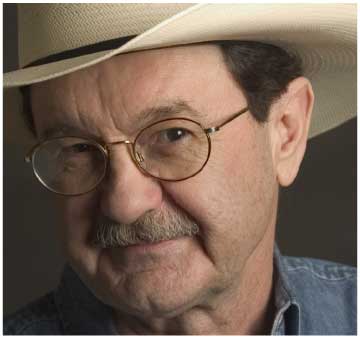
Jim Hightower
Political Boneheads
Hello? People of the future ... Anyone there? It’s your forebears checking in with you from generations ago. We were the stewards of the Earth in 2015—a dicey time for the planet, humankind, and life itself. And ... well, how’d we do? Anyone still there? Hello.
A gutsy, innovative, and tenacious environmental movement arose around the globe back then to try lifting common sense to the highest levels of industry and government. We had made great progress in developing a grassroots consciousness about the suicidal consequences for us (as well as those of you future earthlings) if we didn’t act pronto to stop the reckless industrial pollution that was causing climate change. Our message was straightforward: When you realize you’ve dug yourself into a hole, the very first thing to do is stop digging.
Unfortunately, our grassroots majority was confronted by an elite alliance of narcissistic corporate greedheads and political boneheads. They were determined to deny environmental reality in order to grab more short-term wealth and power for themselves. Centuries before this, some Native American cultures adopted a wise ethos of deciding to take a particular action only after contemplating its impact on the seventh generation of their descendants. In 2015, however, the ethos of the dominant powers was to look no further into the future than the three-month forecast of corporate profits.
As I write this letter to the future, delegations from the nations of our world are gathering to consider a global agreement on steps we can finally take to rein in the looming disaster of global warming. But at this convocation and beyond, will we have the courage for boldness, for choosing people and the planet over short-term profits for the few? The people’s movement is urging the delegates in advance to remember that the opposite of courage is not cowardice, it’s conformity—just going along with the flow. After all, even a dead fish can go with the flow, and if the delegates don’t dare to swim against the corporate current, we’re all dead.
So did we have the courage to start doing what has to be done? Hello ... anyone there?
A national radio commentator, writer and public speaker, Hightower is also a New York Times best selling author.
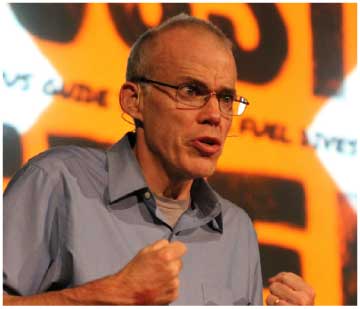
Bill McKibben
Seize the Moment
Dear Descendants,
The first thing to say is, sorry. We were the last generation to know the world before full-on climate change made it a treacherous place. That we didn’t get sooner to work slowing it down is our great shame, and you live with the unavoidable consequences.
That said, I hope that we made at least some difference. There were many milestones in the fight—Rio, Kyoto, the debacle at Copenhagen. By the time the great Paris climate conference of 2015 rolled around, many of us were inclined to cynicism.
And our cynicism was well-taken. The delegates to that convention, representing governments that were still unwilling to take more than baby steps, didn’t really grasp the nettle. They looked for easy, around-the-edges fixes, ones that wouldn’t unduly alarm their patrons in the fossil fuel industry.
But so many others seized the moment that Paris offered to do the truly important thing: Organize. There were meetings and marches, disruptions and disobedience. And we came out of it more committed than ever to taking on the real power that be.
The real changes flowed in the months and years past Paris, when people made sure that their institutions pulled money from oil and coal stocks, and when they literally sat down in the way of the coal trains and the oil pipelines. People did the work governments wouldn’t—and as they weakened the fossil fuel industry, political leaders grew ever so slowly bolder.
We learned a lot that year about where power lay: less in the words of weak treaties than in the zeitgeist we could create with our passion, our spirit, and our creativity. Would that we had done it sooner!
An author, educator and environmentalist, McKibben is co-founder of 350.org, a planet-wide grassroots climate change movement. He has written more than a dozen books.
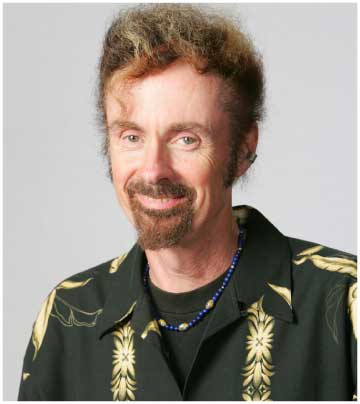
T.C. Boyle
Sorry About That
Dear Rats of the Future:
Congratulations on your bipedalism: it’s always nice to be able to stand tall when you need it, no? And great on losing that tail too (just as we lost ours). No need for that awkward (and let’s face it: ugly) kind of balancing tool when you walk upright, plus it makes fitting into your blue jeans a whole lot easier. Do you wear blue jeans—or their equivalent? No need, really, I suppose, since you’ve no doubt retained your body hair. Well, good for you.
Sorry about the plastics. And the radiation. And the pesticides. I really regret that you won’t be hearing any birdsong anytime soon, either, but at least you’ve got that wonderful musical cawing of the crows to keep your mornings bright. And, of course, I do expect that as you’ve grown in stature and brainpower you’ve learned to deal with the feral cats, your one-time nemesis, but at best occupying a kind of ratty niche in your era of ascendancy. As for the big cats—the really scary ones, tiger, lion, leopard, jaguar—they must be as remote to you as the mammoths were to us. It goes without saying that with the extinction of the bears (polar bears: they were a pretty silly development anyway, and of no use to anybody beyond maybe trophy hunters) and any other large carnivores, there’s nothing much left to threaten you as you feed and breed and find your place as the dominant mammals on earth. (I do expect that the hyenas would have been something of a nasty holdout, but as you developed weapons, I’m sure you would have dispatched them eventually).
Apologies too about the oceans, and I know this must have been particularly hard on you since you’ve always been a seafaring race, but since you’re primarily vegetarian, I don’t imagine that the extinction of fish would have much affected you. And if, out of some nostalgia for the sea that can’t be fully satisfied by whatever hardtack may have survived us, try jellyfish. They’ll be about the only thing out there now, but I’m told they can be quite palatable, if not exactly mouth-watering, when prepared with sage and onions. Do you have sage and onions? But forgive me: of course you do. You’re an agrarian tribe at heart, though in our day we certainly did introduce you to city life, didn’t we? Bright lights, big city, right? At least you don’t have to worry about abattoirs, piggeries, feed lots, bovine intestinal gases and the like—or, for that matter, the ozone layer, which would have been long gone by the time you started walking on two legs. Does that bother you? The UV rays, I mean? But no, you’re a nocturnal tribe anyway, right?
Anyway, I just want to wish you all the best in your endeavors on this big blind rock hurtling through space. My advice? Stay out of the laboratory. Live simply. And, whatever you do, please—I beg you—don’t start up a stock exchange.
With Best Wishes,
T.C. Boyle
P.S. In writing you this missive, I am, I suppose, being guardedly optimistic that you will have figured out how to decode this ape language I’m employing here—especially given the vast libraries we left you when the last of us breathed his last.
A novelist and short story writer, T.C. Boyle has published 14 novels and more than 100 short stories.
Read more Letters to the Future at Artvoice.com and LettersToTheFuture.org.
blog comments powered by Disqus|
Issue Navigation> Issue Index > v14n46 (Week of Thursday, November 19) > Letters to the Future This Week's Issue • Artvoice Daily • Artvoice TV • Events Calendar • Classifieds |









 Current Issue
Current Issue